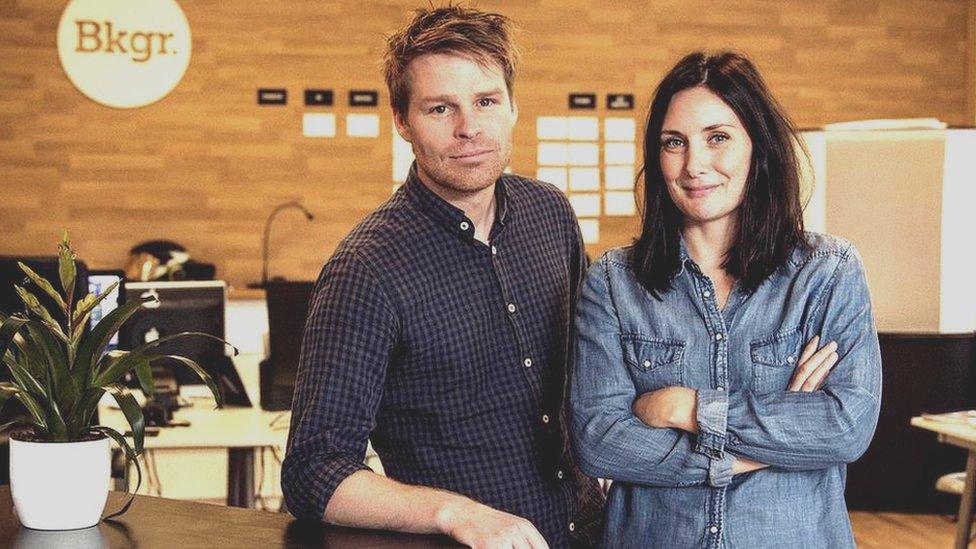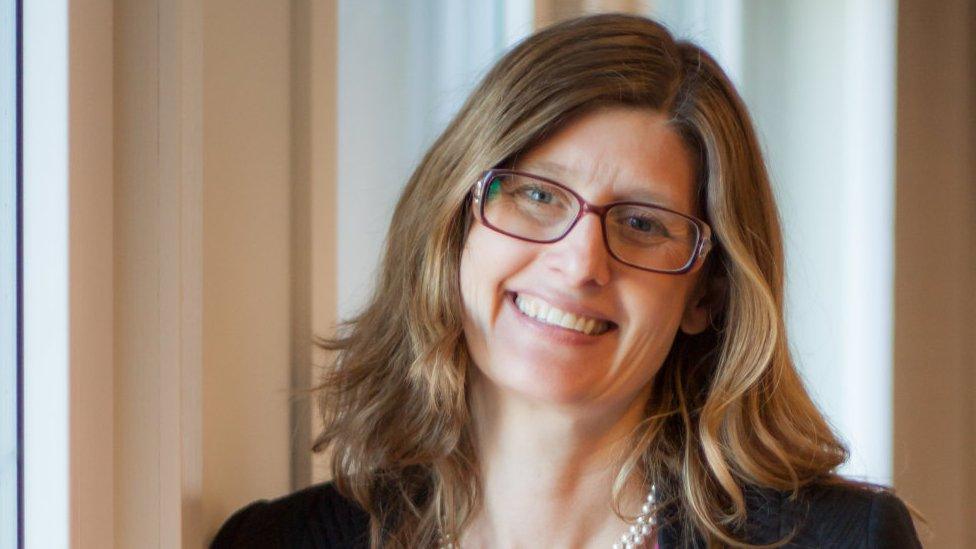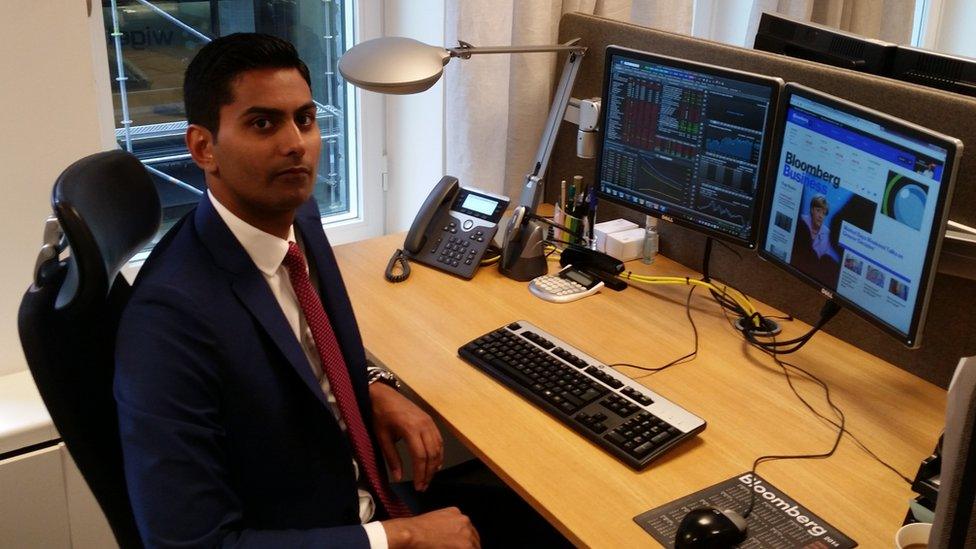The truth about Sweden's short working hours
- Published
- comments

Erika Hellstrom loves being able to close the door to her office at 3.30pm, before heading out for an early evening hike in the deep, green forest that surrounds her home city.
The 34-year-old art director used to have a long and erratic schedule as a freelancer, but she's now based at one of the first Swedish start-ups to offer a standard six-hour day, in Falun in central Sweden.
It's just one of a number of Swedish companies trialling the concept, which is part of a national obsession with work-life balance.
"For me it's absolutely fantastic," Erika says.
"I have more spare time to train or to be outdoors while it is still daylight, or to do work in my garden."
She has no children of her own, but enjoys being able to spend more time with friends and relatives and feels "much less stressed" since her hours were cut.

Company boss Jimmy Nilsson says he is going to trial six-hour days for nine months
Her boss Jimmy Nilsson, who co-owns digital production company Background AB, launched the initiative in September as part of efforts to create a more productive workforce.
"It's difficult to concentrate at work for eight hours, but with six hours you can be more focused and get things done more quickly," he says.
His staff are at their desks between 8.30am and 11.30am, take a full hour off for lunch and then put in another three hours before heading back to their homes in the Swedish mountains.
They're asked to stay away from social media in the office and leave any personal calls or emails until the end of the day. Salaries have not changed since the initiative started in September.
"We're going to try it for nine months and see if it's economical first of all, and secondly if it works for our customers and our staff," Mr Nilsson says.
Inconclusive trials
The concept of six hour days is not entirely new in Sweden, although 2015 has seen something of a revival in the idea.
At Toyota's service centre on the country's west coast, shifts were cut for mechanics more than a decade ago, and with the company reporting a swift increase in profit, it's stuck with the idea ever since.
There were also a handful of trials in the public sector in the 1990s and early 2000s, including one in the northern mining town of Kiruna that ran for 16 years, but was scrapped amid a political row and a lack of raw data to measure its success.

The northern town of Kiruna was home to a 16-year trial of shorter working days
In recent months, several start-ups in Stockholm have joined Background AB in testing the concept, alongside two hospital departments in Umea in northern Sweden and a surgery unit at Sahlgrenska University hospital in Gothenburg.
The most high profile initiative is at an elderly care home in west Sweden, where 80 nurses switched to six-hour days in February as part of a two-year controlled trial of shorter hours. Eighty staff at a similar care home are continuing to work their usual eight-hour shifts.
"It is too early to draw any firm conclusions, but nurses working shorter hours are taking less sick leave and report being less stressed," says Bengt Lorentzon, the lead consultant contracted by Gothenburg City Council to analyse the data.
He says patient care appears to have improved, with staff organising more activities such as dance classes, group reading sessions or outdoor strolls.
"Right now, we're only looking at early indications, but we can see that the quality of work is higher."
Swedish and international policy makers are watching the project closely, with Mr Lorentzon admitting he's been somewhat overwhelmed by the global media interest in his research. He is keen to stress that the six-hour day is still a long way from becoming the working norm in the Scandinavian nation.
More flexible hours
On the other side of the country, career coach Pia Webb, 40, is flitting between meetings in Stockholm.

Swedish businesses understand that a healthy workforce is more productive, says Ms Webb
"I don't know anyone in my network who only works six hours a day," she laughs.
"Many of my clients are managing directors who think that work is the most important thing, and [then] realise they haven't spent time with their children."
But she says she is not surprised that the short shift trials in Gothenburg and elsewhere have captured so much attention given Sweden's reputation for work-life balance.
"Swedish businesses see the link between health and profitability," she says.
"Big organisations give out gym passes. There are more flexible hours - you can work your life around picking up and dropping off your children."
A former IT manager who admits experiencing burnout herself, she recently penned a self-help book aimed at international professionals titled 'Improve Your Own Quality of Life: The Swedish Way'.
'Mutual respect'
Across Sweden, only around 1% of employees work more than 50 hours a week, one of the lowest rates in the OECD, where 13% is the average. By law, Swedes are given 25 vacation days, while many large firms typically offer even more. Parents get 480 days of paid parental leave to split between them. Most offices are empty after 5pm.
"It's a very different experience to when I worked in the UK and clients wanted to stay in touch on weekends and during the evening," says Canadian-born Ameek Grewal, 29, who relocated from London to Citibank's Nordic headquarters in Stockholm a year ago.

Ameek Grewal left his banking job in London to move to Sweden

Mr Grewel says the Swedish way is very different, but overall beneficial
While he argues that the environment might at times feel "frustrating" for those used to putting in longer hours or getting swift responses from clients, he's convinced that the Swedish model brings far greater benefits than drawbacks.
"Here there is a mutual respect. I'll wait until office hours to call or email my customers and at the same time I know I won't be phoned when I'm on holiday."
But fewer hours do not necessarily lead to less stress, according to Mrs Webb.
"The first thing I thought when I heard about six-hour days was 'what are they going to do with their time?'," she says.
"I already see a lot of clients who finish work at 4pm to 5pm but they end up trying to take their kids to all these activities, to exercise, to make homemade food…
"They have the summer house, they have the boat, so in theory they've got all this stuff to help them relax but it just makes more work for them. It's a very Swedish problem… In theory we have this work-life balance but, actually, we're not very good at sitting around and doing nothing."
Maddy Savage is a British journalist based in Stockholm. She is editor of The Local Sweden.